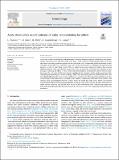| dc.contributor.author | Tomova, L | |
| dc.contributor.author | Saxe, R | |
| dc.contributor.author | Klöbl, M | |
| dc.contributor.author | Lanzenberger, R | |
| dc.contributor.author | Lamm, C | |
| dc.date.accessioned | 2021-10-27T20:34:38Z | |
| dc.date.available | 2021-10-27T20:34:38Z | |
| dc.date.issued | 2020 | |
| dc.identifier.uri | https://hdl.handle.net/1721.1/136273 | |
| dc.description.abstract | © 2019 The Authors Acute stress is often evoked during social interactions, by feelings of threat or negative evaluation by other people. We also constantly interact with others while under stress – in the workplace or in private alike. However, it is not clear how stress affects social interactions. For one, individuals could become more selfish and focused on their own goals. On the other hand, individuals might also become more focused on affiliating with potential social partners, in order to secure their support. There is, indeed, accumulating behavioral evidence that prosocial behaviors increase rather than decrease under stress. Here, we tested the underlying brain processes of such findings, by assessing the effects of stress on the neural representations of (monetary) value for self and other. Participants (N = 30; male, 18–40 years) played a gambling task for themselves and for another participant while undergoing functional magnetic resonance imaging (fMRI). Each participant played the gambling task twice: once immediately following acute stress induction, and once in a control session. We compared neural patterns of value representation in the dorsomedial prefrontal cortex (dmPFC), ventromedial prefrontal cortex (vmPFC) and striatum using representational similarity analysis (RSA). We found that under stress, dmPFC and striatum showed higher dissimilarity between neural patterns underlying high and low value for the other. Dissimilarity of neural patterns underlying high and low value for the self was unaffected by stress. These findings suggest that participants track the magnitude of possible rewards for others more under stress, suggesting increased prosocial orientation. | |
| dc.language.iso | en | |
| dc.publisher | Elsevier BV | |
| dc.relation.isversionof | 10.1016/J.NEUROIMAGE.2019.116497 | |
| dc.rights | Creative Commons Attribution-NonCommercial-NoDerivs License | |
| dc.rights.uri | http://creativecommons.org/licenses/by-nc-nd/4.0/ | |
| dc.source | Elsevier | |
| dc.title | Acute stress alters neural patterns of value representation for others | |
| dc.type | Article | |
| dc.contributor.department | Massachusetts Institute of Technology. Department of Brain and Cognitive Sciences | |
| dc.relation.journal | NeuroImage | |
| dc.eprint.version | Final published version | |
| dc.type.uri | http://purl.org/eprint/type/JournalArticle | |
| eprint.status | http://purl.org/eprint/status/PeerReviewed | |
| dc.date.updated | 2021-03-24T17:01:25Z | |
| dspace.orderedauthors | Tomova, L; Saxe, R; Klöbl, M; Lanzenberger, R; Lamm, C | |
| dspace.date.submission | 2021-03-24T17:01:26Z | |
| mit.journal.volume | 209 | |
| mit.license | PUBLISHER_CC | |
| mit.metadata.status | Authority Work and Publication Information Needed | |
